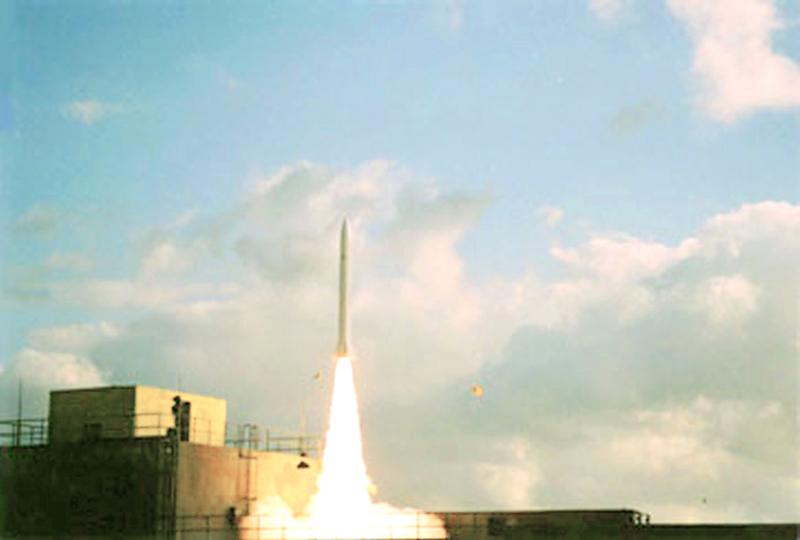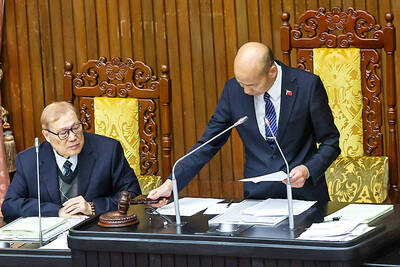The Chungshan Institute of Science and Technology yesterday said that alleged fraud in the production of indigenous Tien Kung missiles (Skybow, 天弓) would not affect national security, after local media reported that local contractors had used poor quality Chinese-sourced materials.
Chinese-language Mirror Media magazine yesterday reported that local contractors involved in the production of Tien Kung missiles had used inferior-quality silicon controlled rectifiers (SCR) sourced from China, severely affecting missile capabilities.
The Tien Kung family of missiles, especially Tien Kung-III, is expected to become the nation’s main anti-aircraft platform, and if they were unable to launch as a result of poor components, it would heavily compromise national security, the magazine said.

Photo: Yu Jui-jen, Taipei Times
The institute said that it had discovered the attempts to pass off inferior goods for original equipment in March last year.
It refuted the magazine’s report that the incident has affected national security, saying that it has implemented existing measures that would minimize the incident’s effect on arms production and other projects.
The institute said that it had reached out to US-based Semitronics Corp, the only company capable of manufacturing SCRs used in the Skybow missiles to military specifications, and that both sides agreed to implement measures that would facilitate the institute’s efforts to confirm that the products originated from Semitronics.
The managers of contractors Onsen Taiwan Cosmetics Corp (昂神國際) and Burnaby Light Technology Corp (勳章科技) — Chen Ching-mao (陳清茂), 55, and his sons, Chen Yen-chang (陳彥璋), 31, Chen Yen-hsun (陳彥勳), 28 — were indicted on fraud and forgery charges last year.
The Chens had first delivered to the institute 84 Semitronics-manufactured SCRs, but its later deliveries were inferior stock from China, prosecutor reports showed.
The Chens falsified device serial numbers and import papers to skim money off the project, making NT$100 million (US$3.59 million) from the deals, the reports said.
“We welcome all business owners to invest in the national defense sector and be a part of building an autonomous national defense industry,” the institute said, adding that it would tighten oversight and management measures to ensure that all projects produce high-quality results on time.
The Legislative Yuan on Jan. 11 approved the Government’s Special Budget for Procurements to Enhance Combat Capability for the Navy and the Air Force (中央政府海空戰力提昇計畫採購特別預算案), totaling NT$236.96 billion.
Under the law, the Ministry of National Defense was expected to draft regulations to prevent contractors from using Chinese goods and to brief the legislature of said regulations within a month of the budget’s approval.
A separate addendum, citing how 19.8 percent of goods provided by contractors in 2020 were flawed, demanded that the ministry and the institute implement quality-control measures for their contractors.
As of press time last night, the ministry had not delivered the draft to the legislature.
The institute admitted that the SCRs were used in other missiles outside of the Tien Kung family of missiles, but declined to name the type of missiles affected, citing classified data.
Allegations that the Taiwanese military had been “unable” to track Chinese People’s Liberation Army ship and plane movements in 2020 were baseless rumors, the institute added.
The institute had discovered attempts to pass off inferior-quality SCRs as Semitronics-manufactured SCRs during quality control, adding that the components had never been installed in the missiles, said a source who spoke on condition of anonymity.
Additional reporting by Yu Jui-jen, Wu Su-wei and Aaron Tu

DEFENDING DEMOCRACY: Taiwan shares the same values as those that fought in WWII, and nations must unite to halt the expansion of a new authoritarian bloc, Lai said The government yesterday held a commemoration ceremony for Victory in Europe (V-E) Day, joining the rest of the world for the first time to mark the anniversary of the end of World War II in Europe. Taiwan honoring V-E Day signifies “our growing connections with the international community,” President William Lai (賴清德) said at a reception in Taipei on the 80th anniversary of V-E Day. One of the major lessons of World War II is that “authoritarianism and aggression lead only to slaughter, tragedy and greater inequality,” Lai said. Even more importantly, the war also taught people that “those who cherish peace cannot

STEADFAST FRIEND: The bills encourage increased Taiwan-US engagement and address China’s distortion of UN Resolution 2758 to isolate Taiwan internationally The Presidential Office yesterday thanked the US House of Representatives for unanimously passing two Taiwan-related bills highlighting its solid support for Taiwan’s democracy and global participation, and for deepening bilateral relations. One of the bills, the Taiwan Assurance Implementation Act, requires the US Department of State to periodically review its guidelines for engagement with Taiwan, and report to the US Congress on the guidelines and plans to lift self-imposed limitations on US-Taiwan engagement. The other bill is the Taiwan International Solidarity Act, which clarifies that UN Resolution 2758 does not address the issue of the representation of Taiwan or its people in

The Philippines yesterday criticized a “high-risk” maneuver by a Chinese vessel near the disputed Scarborough Shoal (Huangyan Island, 黃岩島) in a rare incident involving warships from the two navies. The Scarborough Shoal — a triangular chain of reefs and rocks in the contested South China Sea — has been a flash point between the countries since China seized it from the Philippines in 2012. Taiwan also claims the shoal. Monday’s encounter took place approximately 11.8 nautical miles (22km) southeast” of the Scarborough Shoal, the Philippine military said, during ongoing US-Philippine military exercises that Beijing has criticized as destabilizing. “The Chinese frigate BN 554 was

LEISURE: The new law adds Confucius’ birthday, the anniversary of the Battle of Guningtou, Constitution Day and Little New Year as national holidays The Legislative Yuan yesterday passed new legislation adding four national holidays and making Workers’ Day a national holiday for all sectors. The Chinese Nationalist Party (KMT) and the Taiwan People’s Party used their combined majority in the legislature to push the jointly proposed draft through its third and final reading. This new law supersedes the existing regulations for the implementation of memorial days and state holidays, which are administered by the Ministry of the Interior. The new law recognizes Confucius’ birthday on Sept. 28, the anniversary of the Battle of Guningtou on Oct. 25, Constitution Day on Dec. 25 and “Little New Year,”